Cuba

">
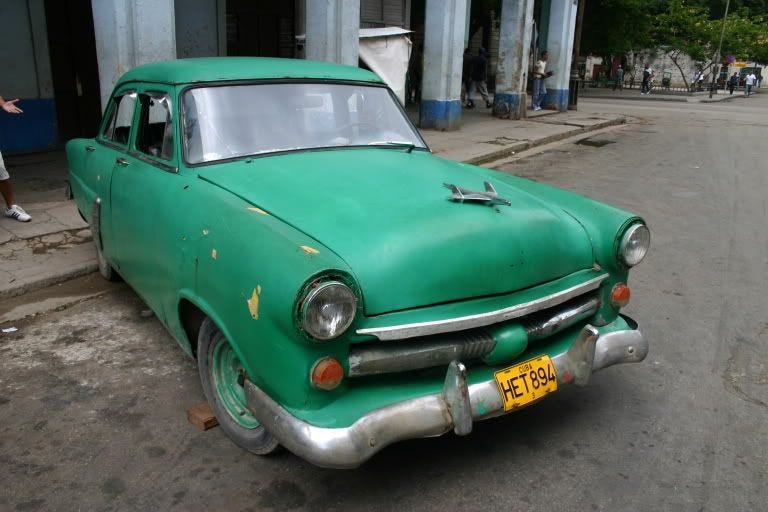
">

">
Night 3
I am now in Cuba. I came here to be alone with my thoughts for a couple weeks, but I came to the wrong place. Every time I go somewhere, whether it´s a restaurant, at the beach, or in the bathroom, the Cubans refuse to leave me alone. Their cumulative charm has forced me to relinquish my quest for solitude. I truly believe these people are the warmest, most gregarious humans on the planet. Seriously. Yesterday I met some people at a restaurant where I was sitting alone. We began talking and then spent the day together, a Cuban guy and two Dutch women. It is borderline illegal for Cubans to hang out with foreigners. My Cuban friend bet me a mojito that he would get stopped at least once that day and asked for ID. Literally two minutes after leaving the restaurant he was stopped. We went to watch a Cuban baseball game between arch rivals Industriales and Habana del Campo, both from Havana. Instead of peanuts and cracker jacks, there were caramelos and jamon y queso. Instead of ballboys there were ballmen. And instead of paying 50 dollars for a ticket, I paid 5 cents for the best seat in the house. Everywhere I go I pretend I’m Cuban because there is a double economy here, one for tourists and one for locals. If they think I’m Cuban I get to pay for things in Moneda Nacional (pesos cubanos), which has roughly the same value as Monopoly money. If they think I’m a foreigner I have to pay in pesos convertibles which have the same value as dollars. I also got a financial kick in the ass today. I spent all my Canadian dollars and had to change my US dollars into pesos convertibles and there is a 10 percent surcharge on US dollar exchanges. Fidel´s sweet revenge against the embargo. (There is another more logical reason behind the tax that I learned later from a guy known as “Your Man in Havana,” who seems to have his finger on Cuba’s pulse. The Cuban government historically maintained dollar accounts in various Swiss banks. Once the US government became privy to this information, they boycotted these banks on the grounds that they were handling “dirty dollars” from Cuba. These banks then stopped allowing dollars from Cuba, which prompted Fidel to then remove dollars from the Cuban economy.
I had one of the weirdest Passover Seders of my life. The first night I went to a Chabad-run Seder. In my travels I have come to realize that there are two universal things in this world. 1. Coca Cola 2. Chabad. While North Korea has neither, Iraq has number only 1, Cuba has both. I had to explain the entire Passover Seder to this Cuban woman who wasn´t Jewish but was writing her undergraduate thesis on Cuba’s Jewish community. She in turn explained to me the vices and virtues of the Castro regime. It was interesting. There was an old poor man sitting next to me who multiplied the four cups of wine we traditionally drink by ten and might have broken the Guiness World Record for “most matzah consumed in a single sitting.” The poor guy was obviously hungry and also had a few screws loose. However, every so often he would surprise me by muttering the blessing with a typical Ashkenazi accent. The next night I went to another synagogue called “El Patronato.” It rocked. Ive never seen a Seder so full of life.
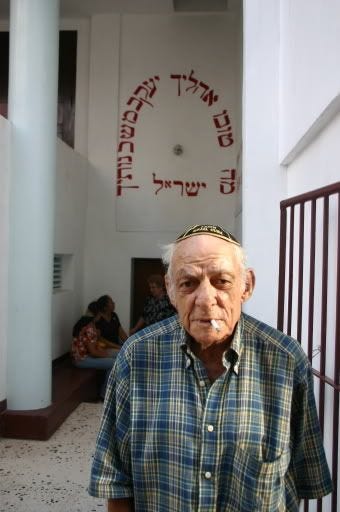
A Jew-ban
Night 4:
This country is so vibrant. Walking down the streets I am constantly hearing this up-tempo cha cha cha song that everyone seems to groove to. The place has a rhythm and color scheme all of its own. It also seems like everyone I talk to is a musician or an artist. I am flabbergasted at the way these Cubans move their bodies. I went to a Salsa club tonight and they made it look so easy that I figured I’d try to step in and learn it on the fly. Bad move. I was horrible and nearly crushed my poor partner on multiple occasions.
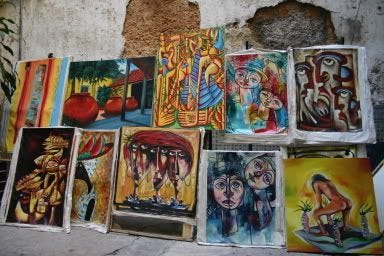


Night 5:
I now feel like I have a better understanding of the Cuban mindset. I spent last night and most of the day with a 30-year old man depressed by his economic state. His father left to Miami when he was young, and he says the “Libreta,” or ration-card, given to him by the government is not sufficient. I am so frustrated here because I came here to film a documentary for Current, and I am getting some good stuff, but the truth really comes out once the cameras are off. And the truth as I see it is that people here are suffering, yet many of them still support the Revolution. I’ve observed an uncanny capriciousness amongst Cubans with regards to their situation. They can’t decide if the Revolution was good or bad. Yet their opinions must be footnoted with a large asterisk. How much freedom of thought do they have? If their situation was bad, how would they know it? They can’t travel or see anything else. All media is state controlled. So they say they support Castro and his Revolution. “Fidel es mi papa”, they say. I think this is the truest of Cuban sayings. You may not agree with everything your father tells you or makes you do, but you’ve only got one….There is just so much to take in here and the situation is so complicated that I am now exhausted and I’m going to sleep. I switched casas and I’m now in a great place. The senora gave me a fresh-squeezed orange juice when I walked in the door sweaty and exhausted. She also has delicious omelettes for breakfast every morning.
Night 6:
Today was a great day. I don’t know why. It just was. I ate Cuban ice cream, had great interviews, made new friends, and gained some new insight into the Cuban character. They are an amazingly resilient and unified people, and US policy plays right into the hands of Fidel, who has a bad guy to always point the finger at. The propaganda here is nothing short of brilliant. One sign directly opposite the Office of US Interests in Cuba has George Bush and Luis Carriles Posada, both with devil eyes and fangs for teeth, starring in a Hollywood action movie called “El Asesino.” If you don’t know who Posada is, you should. He is a terrorist in the truest sense of the word, responsible for blowing up a Cuban airliner, killing 73 civilians. Yet due to a double standard, he is a free man in Miami. For some people in Miami, he’s a hero.
Anyhow back to my day. There is such a positive energy about this place. It has made me question the nature of freedom. While these people are not free to criticize the government or leave the country, there is a feeling of personal freedom that I have not seen anywhere else in the world. People seem free to be themselves here. There is no judgement on what you wear, who you hang out with, what you do for a living. Its so refreshing how approachable people are here. They will never shun you or give you a weird look for initiating conversation. On the contrary, they welcome you. Conversations are never shorter than they need to be. In a week I feel like I have made a new friend every single day. They are always outside their homes. They know their neighbors. There is a sense of a common destiny. Through good times and bad times, they will stick it out together.
This is another part of the world where AFP (American Foreign Policy), namely the embargo, is logically and sociologically counterintuitive. Fidel Castro should thank his lucky stars for the embargo, for he probably would not be in power otherwise. America’s most powerful weapon today are its powerful multinational corporations, which have the potential to affect mass cultural change. This weapon has been unleashed on every single country in the world, except for Cuba. Why did Bin Laden wage war on America? Through American multinational corporations, American values threaten the Islamic values he cherishes. So how does America deal with Cuba? It decides not to trade with Castro, sparing the island from America’s capitalist consumer culture, its values and ideas, which allows Castro to maintain total thought control over the populace. The embargo ensures that the competition of ideas is always won by Castro’s socialism, since the US has withdrawn itself unilaterally from competition. This policy is not only unethical and punitive, but it is counterintuitive in achieving its desired goal, which presumably is regime change in Cuba.
It is equally counterintuitive from a sociological perspective. Group suffering forges group bonding. If an American leader could simply look at some of the propaganda here, he/she would realize that the embargo provides a perfect Post-Revolution scapegoat, allowing Fidel Castro to blame financial problems on arch enemy #1, rather than his backwards economic policies. Castro, the good communist, never misses the opportunity to capitalize off of this policy blunder. As such, it is the subject of much propaganda here. “No Al Bloqueo” (No to the Blockade) the signs read. It is on the front page of the newspapers here. And it ranks number one in sore subjects amongst Cubans. While Fidel puts up signs that say “Vamos Bien,” (We’re going well), a cab driver told me that only he (Fidel) is going well. In short, there is counter-revolutionary sentiment, although it will never fester as long as the blame is divided between Castro and the US. I am learning that this Revolution did not just happen in 1959, but in the minds of Cuban believers, is still happening. The irony is that the embargo might just be the Revolutionary fuel.
Night 7
I appreciate that I can criticize my government freely and without fear of reprisal.
Night 8
Today was spectacular. I scuba dived in Punta Perdiz in the Bay of Pigs. Totally amazing. Even my giant kindergarten crayon box with 500 colors didn’t have so many hues of blue and green as the inviting water. The coral was completely undamaged and the black and yellow sergeant majors were so unafraid that they would swim in and out of my hand. I guess the fish are friendlier in Communist countries.
As a result of my 25-peso dive I probably will have to camp out the last night because I had budgeted exactly enough money to pay for necessities for the rest of my trip. American bank cards don’t work because of the embargo. I was even wired 300 dollars the other day through Western Union, which is the maximum any single individual can receive in Cuba for a 3-month period. I now starting to feel like a real Cuban.
Night 10
Hitchhiked from Playa Giron to Cienfuegos today. I was picked up by a nice Italian couple on their honeymoon. We spent the time talking politics, which I realize is something I tend to do.
Night 11
Cienfuegos is a blur. I was looking for an internet café that was in the guide book. When I got to the address I realized it wasn’t there, so I asked someone what happened to it. She shrugged and pantomimed a man with a long beard, “La Barbita,” she said. (The bearded one).
Night 12
The same Italian honeymooning couple took me to Trinidad, an ornate little town tucked between verdant hills and the Caribbean. I again found myself in the company of honeymooners, this time from Slovenia. I was eating there in a paladar when they invited me to join them as they were having a laugh with a “jinitero,” a Cuban hustler, trying to convince them to use his taxi service the next day. I helped translate and ate a piece of fish that tasted like a combination of steak, salt, and rubber. I suddenly realized I was running out of money.
Night 13
Being broke in Cuba isn’t so bad because pretty much everyone is. I needed to make a move and get to Jaguey Grande to write a story on Rafi Eitan’s Citrus Venture there. I would hitchhike so I needed to set out early, because, without money, time is all I had. So I got to the place everyone hitchhikes from at 9 AM. At around midday, I grew impatient and hot and went to the bus station and bribed my way onto a fancy tourist bus for peanuts. The black market in Cuba is more common in Cuba than the regular market to the point that they coined a phrase for it, “a la izquierda” (to the left) means you got something on the black market, which is how most people survive here. So I got to Jaguey, and the first guy that came up to me was in a tie dyed shirt and American gangster-style baggy shorts. I knew this would be my guy. I explained to him that I was running low on dough and he said, “same as us.” I said “I need an interview with someone at the citrus factory, a tour of the facility, and a place to sleep, for 15 dollars.” He said no problem and took me to his sister’s house, who has a Casa Particular, where I dumped my bags. A bici-taxi driver took us around and complained about his plight. He makes 4 dollars a day.

Night 14
The next day after my interviews I gave my tie-dyed friend a pair of shorts that he said he liked. He took me to the hitchhiking outpost and I waited for an hour, before jumping into the back of a giant rig with 15 Cubans in the back headed to Havana. Hitchhiking is the way most people travel in Cuba. There are official hitchhiking outposts where state vehicles are required by law to stop, but rarely do. Most prefer to pick people up at unofficial places, where they can then charge them money. At this point I joined the Cuban economy, changing my remaining pesos convertibles into moneda nacional. Moneda Nacional is the currency Cubans use to buy foodstuffs and transport. It is limited to Cubans and things are much cheaper. Riding on the back of this rig for 10 cents, next to a guy transporting illegal guavas to Havana to sell “a la izquierda” I felt like a Cuban for the first time.
A short footnote to the story: Halfway through the trip, the national revolutionary police boarded the rig and looked through everyone’s bags looking for contraband, which in Cuba includes anything being sold extra-legally and can include seemingly benign items such as guavas. The man lied to the police and told them he wasn’t selling the green and pink stuff when he obviously was. The police confiscated them.
IN THE TRUCK


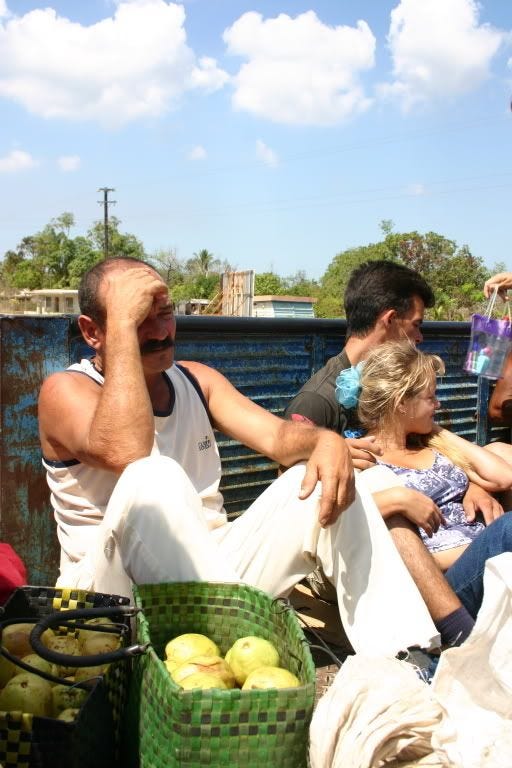
the illegal guava vendor
OLD HAVANA
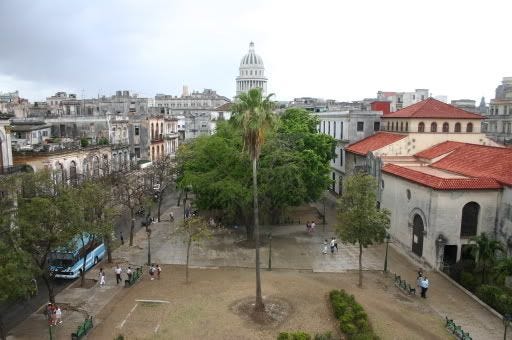
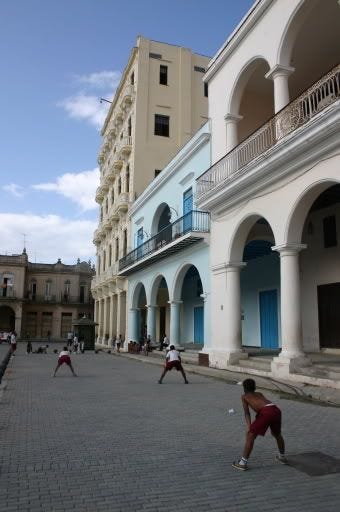
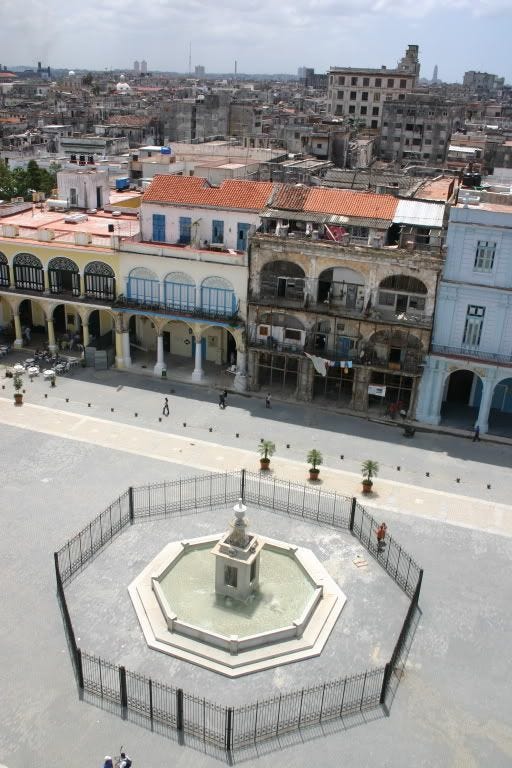

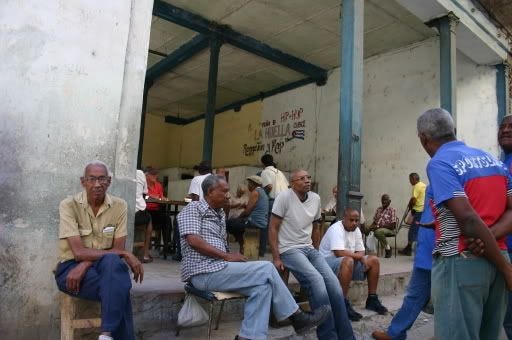
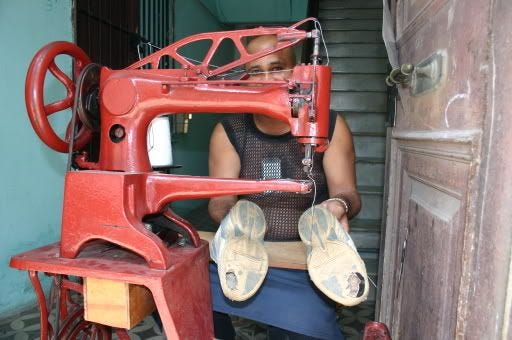



Each Cuban neighborhood is divided into CDR's. CDR stands for Comite de Defensa de la Revolution. They put up these posters define the roles of the "good communists" of the neighborhood.
I stayed in Casas Particulares for all of my time here. This phenomenon began in 1997 after the “periodo especial,” which was the darkest period in post-revolutionary Cuban history. They are homes with rooms to spare which function as quasi-capitalistic businesses. They rent out rooms to foreign tourists for around 25 pesos (30 dollars) a night and have to pay the government 11 pesos per room per night regardless of occupancy. Whatever’s left over they keep. Casas particulares and other privately run businesses that have emerged since the late 90’s are contributing to the burgeoning sense of inequality that exists here.

My first casa particular on the third floor
My first place was great. Right in the heart of Old Havana, clean, and nice people. The second place was not so great. I had to practically beg for coffee this morning and when I asked for a plate for my morning matzah I began to realize how poor these people are. “Lo que me sobra son platos”, (What I have extra are plates), the señora said, implying a lack of the things that go on plates, namely food. Its in a crumbling building that must be at least 50 years old. I´m the only foreigner in the casa, and it is always dark and dreary. Its only redeeming quality is that it’s a block from the Malecon, Havana´s famous waterfront promenade. The third casa I stayed in the people were so well off that they fly every year to Holland for 2000 dollars to visit their son there.
Reflections on two weeks here:
I do not want to leave this place. Broke as a joke, I find myself eager to come back here with more money, more medicine, and more understanding of the Cuban predicament. I’ve come to realize this is the land of oxymorons:
It is communist, yet its people have an amazing capacity for making money.
People are poor, yet no one dies of hunger.
America is the land of Yankee imperialists responsible for the evil embargo, yet Yankee hats are the most popular on the street.
There is a surplus of doctors but no medicine.
They love Fidel, yet they hate Fidel.

